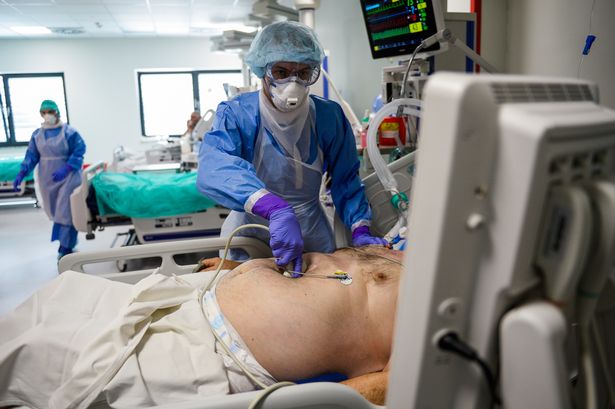[ad_1]
Top doctors in Wales say they are seriously concerned about the long delays to routine surgeries and cancer treatments.
In March the Welsh Government were roundly applauded for suspending all non-essential procedures to help the NHS cope with the first wave of coronavirus. But six months on and the Welsh NHS is in dire straits. Though it was quick to turn the tap off, getting it running again is proving to be a real challenge.
Not only have many elective surgeries barely even got going in Wales, the Welsh Government has not published the waiting times since March so we do not know how big the problem is.
Though these procedures are known as “elective” and are therefore classed as “non-urgent”, that doesn’t mean they are not vital. They include many cancer treatments and hip replacements and often would alleviate severe pain and suffering.
We spoke to Dr Phil Banfield, chair of the British Medical Association’s Welsh Consultants Committee, and Mr Richard Johnson, a consultant breast surgeon based in the Princess of Wales Hospital in Bridgend.
How large is the backlog?
The backlog is known to be significant but it’s impossible to give a definitive answer on how long it really is.
A freedom of information request by the BBC suggested that the list of people waiting for routine surgery in Wales is nearly six times longer than a year ago, with 57,445 awaiting an operation in August 2020 compared with 9,859 during the same period in 2019.
“We’ve been asking for the waiting time figures from Welsh Government because they haven’t been published since March,” said consultant surgeon Mr Johnson.
“We need to be making plans to treat that backlog but we don’t know the extent of the problem to be able to make definite plans going forward.”
What is the current situation?
It is very mixed across Wales.
Dr Banfield said: “Whilst some surgery has resumed, non-Covid patients have suffered. Many ill patients are not getting the care they desperately need and they risk their conditions deteriorating. Some may have sadly died.
“It doesn’t appear that Covid-19 is going anywhere anytime soon so it’s vital that patients continue to get the care and treatment they need. The doctors of Wales are ready to play their part but need to be better engaged in planning and delivery of services. The cost of investing in safe service expansion is great, but the cost of not doing this will be greater”.
Cancer screening and treatment have recommenced, but capacity is massively reduced and it takes time and additional resources to catch up to shorten waiting times again. Orthopaedics has been particularly badly affected, because so much depends on hospital bed capacity and theatre access.
According to the BMA “there is virtually no medical specialty that is untouched” but how bad the situation is depends on where you live.
“It is very patchy across health boards and hospitals,” said Mr Johnson.
“There is no consistency so there is a bit of a postcode lottery going on depending on where you are living and how well your health board is getting their plans going again.”
In a statment the BMA added: “Mental health services have struggled because of increased demand and deployment of staff during the first wave of Covid. Suicide rates have increased. The service is woefully unfunded and under-staffed; access to interventions that demonstrably improve mental ill-health, such as cognitive behaviour therapy, is said to be non-existent in some areas.”
Why is it taking so long to work through the backlog?
Part of the problem with operations is how long it takes to do a single procedure compared to before the crisis.
“Staff have been redeployed to other areas to support the pandemic and it’s taking time to getting those staff back to the normal place of work to allow it to get elective procedures going,” said Mr Johnson.
“The turnaround time is also a lot slower for operations because of all the increased infection control measures we have to follow. We are losing 30-60% of our normal capacity.”
Orthopaedics has been particularly badly affected because many theatres were converted to generate additional rooms to ventilate critically ill patients, as part of expanding intensive care capacity in hospitals in Wales.
It has been frustratingly slow to get that capacity back – BMA feedback from consultants estimates that about 20% of the previous work done is being undertaken currently, so the waiting lists and times are set to keep growing.
What do surgeons want the Welsh Government to do to deal with the problem?
Mr Johnson says there are a few steps they want the Welsh Government to take. The first is to publish the waiting lists.
Second, they want the Welsh Government to continue to use the private sector to get through the backlog.
Thirdly, the Royal College of Surgeons wants the Welsh Government to set up Covid-light hospitals. These are facilities which aim to have zero Covid-19 inside them.
They do not take emergency procedures and there is a strict testing regime, the idea being that not as many safeguards will be needed inside so that operations can be conducted quicker. This means operations can be conducted in their normal timescales.
Fourth, they want the Welsh Government to have a regional or national strategy instead of just leaving it to health boards.
What is the Welsh Government’s plan?
The Welsh Government is currently relying on local health boards to set up Covid-light corridors or “green zones” in their hospitals.
Mr Drakeford painted a bleak picture, saying delays were “inevitable and inescapable”.
He added: “While the heath service is working very hard to create the conditions in which as much activity as possible can be safely carried out while the coronavirus crisis continues, there’s no escaping the fact that there will be longer waits for some procedures in Wales than we have seen for some time.”
Creating Covid-light pathways inside hospitals is being pursued by Welsh health boards but doctors fear that with a potential second spike in the winter this will become harder to do as community cases rise.
Mr Johnson said: “Major cancer surgeries require more access to intensive therapy after the surgery and therefore it is very hard to create Covid-light pathways to these units because they tend to be in the centre of hospitals. It depends on the size of the hospital how hard it is to separate the non-Covid patients.”
How long could it take the NHS to get back to where it was before the crisis?
According to the BMA, consultants in Wales are reporting that hospitals are full already, even before the expected winter crisis and at a time when the number of Covid-19 admissions is expected to continue to rise for a while yet.
Even before Covid, this was not a system that was working well. Waiting lists were already long and every winter our NHS was coming under extreme pressure.
Mr Johnson said that, going forward, there needs to be a strategy and funding to meet this increased demand and growing waiting lists.
He said: “We are also looking for long-term plans to manage the situation. There is an issue about training future surgeons. Even if Covid went away tomorrow we would still need to know what the full extent of the problem is that we are dealing with because we need to make appropriate plans to get through that backlog. We need the Welsh Government to publish the waiting times.”
How have other countries coped with this issue?
Coronavirus is not a Wales-only issue ,but the UK as a whole has underfunded its health care system for a long time.
In a statement the BMA said: “Everyone is struggling. The UK had one of the lowest numbers of doctors and hospital beds per 1,000 population in Europe. We went into the pandemic with a chronic shortage of intensive care beds, the lowest per capita in Europe.”
What effect is this having on patients?
Even those patients who do not die while waiting are facing real issues if the lists keep growing.
“There are a lot of patients waiting for hip and knee replacements in a lot of pain and their condition is deteriorating,” said Mr Johnson. “Therefore when they come to have surgery their surgery is potentially more complicated and there is also an increased recovery time.
“There is also an increased reliance on painkillers, they will need more help at home to manage normal activities, they can’t go to work. It’s not just a question of waiting for an operation but also the reason they are having the operation.”
This is not a problem that will get better on its own
If Covid disappeared tomorrow there would still be serious problems coming down the road for the Welsh NHS.
A new report from Public Health Wales has shown that the number of people with a longstanding illness is expected to increase in line with the rise in unemployment following coronavirus, unless interventions are implemented.
Based on an estimated increase in the unemployment rate in Wales from 3.8% in 2019 to around 7% in 2020, projections from Public Health Wales suggest that the proportion of the population suffering from longstanding illnesses could increase by around 4% over the next three years from 46.4% prior to the pandemic to 50.3% in 2022/23.
There could be a greater increase in the percentage of adults living with limiting longstanding illnesses from 18.1% prior to the pandemic to 24.4 % in 2022/23.
The forecast also shows a higher percentage of adults with chronic health conditions. For example, endocrine and metabolic disorders could increase from 7.9 % prior to the pandemic to 10.9% in 2022/23; and mental health problems from 8.8% prior to the pandemic to 11.9% in 2022/23.
[ad_2]



